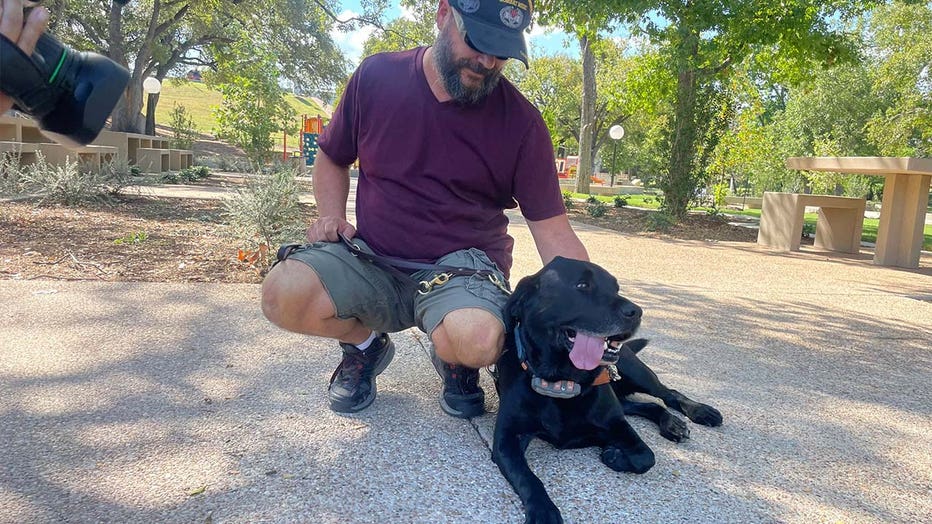Texas veteran wants to educate others after being denied service due to guide dog
Restaurant denies service to veteran with guide dog
A Bertram veteran said he was denied service at a local restaurant because of his service dog. He's now on a mission to educate others about laws protecting people with disabilities.
BERTRAM, Texas - A Bertram veteran said he was denied service at a local restaurant because of his service dog. He's now on a mission to educate others about laws protecting people with disabilities.
Jerry LeBlanc and String Bean are more than two peas in a pod.
"String Bean was issued to me through the prosthetics department," said LeBlanc. "The same place you would go to get crutches or a cane or a wheelchair or whatnot. He is an extension of me, so he’s not a dog in my eyes. He’s a medical device."
LeBlanc served as a combat medic in the Army, catching the tail end of the Gulf War. He's now blind because of the chemicals he was around.
This March, he said he and String Bean went to their local Mexican restaurant in Bertram, El Rancho.
Online university helps veterans get degree
The American Public University System is one of the largest online universities in the country, and they specialize in helping veterans.
"We were met at the door by the manager who stated that ‘if you don’t provide me paperwork proving that he’s a trained service dog, then I can’t let you eat here,’" said LeBlanc.
According to state law, String Bean should be allowed in. But LeBlanc says he’s used to denial like this.
"A lot of times it’s just lack of education," said LeBlanc.
This time, when he tried to educate the manager, he said it didn’t go over well.
"When you have to go as far as attempting to try and do that, and it gets you nowhere, it is very frustrating, especially if you live in a small town and there are not many eating options, then it kind of, at the least, it’s very inconvenient," said LeBlanc.

Jerry LeBlanc and String Bean
So he got the police involved.
"A business owner that kicks somebody out could be subject to paying damages, paying that person’s attorney fees for suing them, and costs, and they could be charged with a misdemeanor offense for doing that," said Denette Vaughn, an attorney for Disability Rights Texas.
She said she sees cases like LeBlanc’s often.
"Way, way too often," said Vaughn. "It’s 2024. I mean this law has been around for over 30 years now. There’s really no excuse for people not knowing, in my personal opinion."
There are two questions business owners can legally ask.
- Do you require this dog because of a disability?
- What tasks is the dog trained to perform?

Jerry LeBlanc and String Bean
"If they get satisfactory answers to those questions and the dog is not behaving inappropriately, they should walk away," said Vaughn.
Letting it go is often the best way to avoid a civil suit or criminal charge.
Perhaps, an even better way to make the lives of veterans living with disabilities a bit easier.
"I don't really see why after all the time after 9/11, and here we are on 9/11 talking about it that people are not aware that this is a medical device," said Vaughn.
Both LeBlanc and Vaughn said the number one thing they hear from business owners is concern about people faking their pets as service animals. To that, they said you will know if an animal is truly trained or not based on their behavior.
Under a new law, people who fake a service animal can be fined up to $1,000 and 30 hours of community service with an organization that works with people with disabilities.
Additionally, anyone who discriminates against a person with a disability because of a service animal could be fined up to $300 and 30 hours of community service.
FOX 7 Austin got in touch with El Rancho. They asked to take our number and a message from the manager, but we did not hear back.

